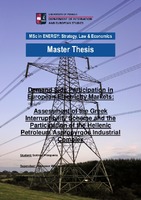Demand Side Participation in European electricity markets: assessment of the Greek interruptibility scheme and the participation of Hellenic Petroleum Aspropyrgos Industrial Complex

Master Thesis
Συγγραφέας
Pitropakis, Sotirios
Ημερομηνία
2020-11Επιβλέπων
Dagoumas, AthanasiosΔαγούμας, Αθανάσιος
Προβολή/
Λέξεις κλειδιά
Energy ; Demand Side Response (DSR) ; Participation ; Interruptibility ; Energy union ; Efficiency ; Auctions ; TSO ; ΑΔΜΗΕΠερίληψη
Demand Side Response (DSR) concept, although not a contemporary idea in the energy policy field, has sprung during the recent years. European Union’s Energy and Climate policy framework has adopted various forms of the concept at all levels of consumption, from large industrial customers up to small households. Having as a policy spearhead the energy efficiency, DSR has been integrated to and promoted through various legislative initiatives within the EU, such as the Energy Union, various energy related directives (Electricity, Energy Efficiency, State Aid), the Network Codes and the Clean Energy Package. DSR programs vary to a large extend and they can be adjusted to many different electricity markets schemes, exhibiting a rather complex classification. In Europe, numerous DSR programs have been established in many countries. In Greece in particular, although the energy market cannot be characterized as a mature one, there is a specific scheme that engages large industrial consumers (HV and MV) to the DSR concept. This is the so called Interruptible Load Service Auction (ILSA) scheme, which runs during the last 4 years under the auspices and management of the Greek TSO. The program is based on load curtailment on-demand from the Greek TSO side towards the consumers. The consumers are being remunerated for their availability to curtail specific loads that have been contracted through an auction procedure that takes place several times throughout a year. In this thesis, the ILSA scheme is analyzed in detailed, both as far as its legal and operational framework is concerned, as well as far as the types of consumers that participate to it. Following the abovementioned analysis, the participation of the Hellenic Petroleum Aspropyrgos Industrial Complex (HELPE-AIC) is assessed as a case study, while at the section of the concluding remarks, some noticeable suggestions for the further penetration of the scheme to the Greek energy market are presented, as well as for HELPE-AIC’s further engagement to the scheme.


